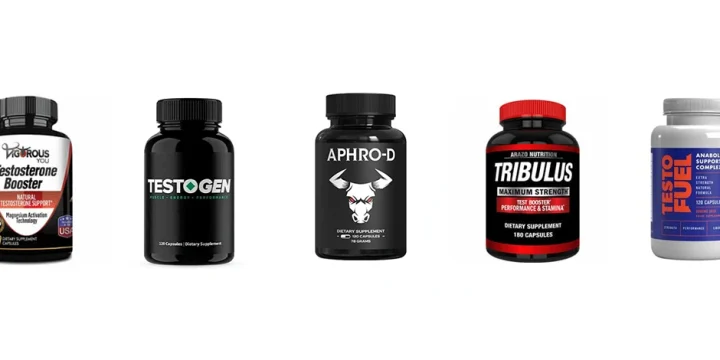The hormone testosterone is possibly one of the most misunderstood ones of the human body.
You might think of it as the engine behind sex drive and gaining muscle mass. But could a hormone that has such a positive effect on manliness be linked to male pattern baldness?
I found the concept intriguing, and once I did some initial research, I knew this was something that might help our readers.
Let’s face it, who wants to grow muscles only to face hair loss as a side effect?
Here’s what the science is.
Quick Summary
- Testosterone boosters do not directly cause hair loss; hair loss can occur due to various factors including genetics, stress, and aging, regardless of testosterone levels.
- Dihydrotestosterone (DHT), a more potent derivative of testosterone, is linked to male pattern baldness, affecting hair follicles differently than testosterone.
- A study published in PubMed indicates that increased levels of DHT, not testosterone, are more closely associated with alopecia in men.
- Personally, I believe understanding the role of hormones like testosterone and DHT in hair health is crucial for effective treatment and prevention of hair loss.
Is Higher Testosterone Linked To Hair Loss?
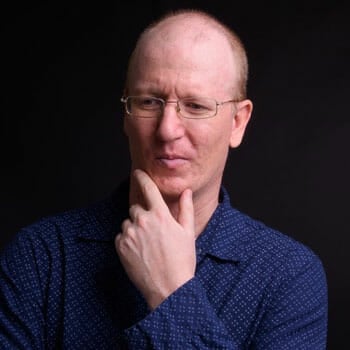
Not necessarily, as hair loss can occur with high or low testosterone levels.
Male pattern baldness, or androgenic alopecia, is a primary concern in hair loss discussions.
It's not solely linked to testosterone levels; factors like genetics and age also contribute significantly.
For a comprehensive understanding and personalized treatment, consulting a healthcare professional is advisable.
The psychological impact of hair loss on men can be profound, often leading to a loss of self-confidence and self-esteem.
Understanding how testosterone boosters might help in managing hair loss is not just about physical appearance but also about addressing these psychological aspects and improving overall well-being.
First, let’s look at the types of testosterone in the male body.
Free Testosterone
Free testosterone plays a key role in various bodily functions, including muscle growth and hair development.
It's particularly active during puberty, leading to increased facial and pubic hair.
Another key hormone in this process is dihydrotestosterone (DHT), which has a significant impact on hair health.
DHT, a derivative of testosterone, plays a dual role in hair health.
It encourages facial and body hair growth but can lead to scalp hair follicle miniaturization, especially in those genetically prone to male pattern baldness.
Grasping how testosterone and DHT interact with hair growth is key to understanding and potentially treating male pattern baldness.
Dihydrotestosterone (DHT)
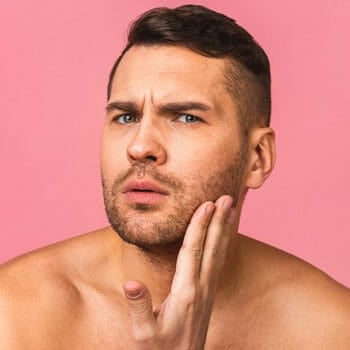
According to the study published in PubMed, DHT is a modified form of testosterone and significantly more potent and effective [1].
It mainly triggers reactions in the prostate, skin, and hair follicles.
And it seems that it’s mainly an increase in DHT that might contribute to alopecia in men.
So, science seems to have linked DHT to alopecia, and more specifically, to the health of hair follicles.
That’s an important factor to consider because not all men produce more DHT just because their testosterone levels increase.
“DHT is a male sex hormone created when certain enzymes convert testosterone in men’s testes and prostate and women’s ovaries. DHT is a more powerful hormone than testosterone that actually is essential for most hair growth — except on the head.”
- WebMD.com
Type Of Hair Loss Associated With DHT
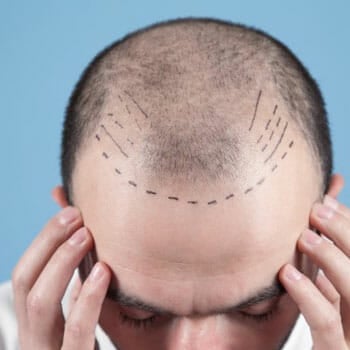
The important thing to keep in mind as well is the type of hair loss linked to DHT.
This is not some random loss of hair follicles but a slowly receding hairline from the top of the forehead.
This usually recedes into an M-shape until the entire crown is bald.
But men can also encounter hair loss on the chest due to high levels of DHT, which often happens at the same time as the male pattern baldness starts on the head.
What Other Causes Are There For Balding?

While testosterone's role in hair regrowth is complex, other key factors contribute significantly:
- Aging: In my coaching experience, aging is a major factor in hair loss. As men grow older, their hair follicles' growth cycle slows, which is why full heads of hair are rare in men in their 80s. While aging is irreversible, understanding its impact is crucial for realistic expectations and appropriate hair care routines.
- Stress: Surprisingly, male pattern baldness in young men often correlates with high stress levels. Stress increases cortisol production, which, as a JDD study reveals, is linked to hair loss [2]. So, consider stress levels before attributing hair loss to testosterone alone.
- Genetics: Genetics also play a significant role. If you're curious about your genetic predisposition, a gene test can provide insights [3]. However, this test is mainly applicable to men, as the genetic factors in female hair loss are less understood.
Related: Do Bald Guys Have Higher Testosterone?
Are There Ingredients In Testosterone Boosters That Can Cause Balding?
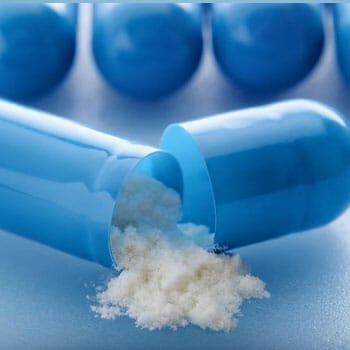
Speaking of supplements, one question we encountered in our research was if there are ingredients in natural testosterone supplements that might contribute to male pattern baldness.
The last thing you want is for your supplement stack to make your hair fall out.
When considering testosterone boosters for hair health, it's important to look at specific ingredients like Green Tea Extract and Saw Palmetto.
These components are not just beneficial for maintaining testosterone levels but have also been shown to curb age-related hair loss and improve hair density and quality.
So, I looked at the ingredients of the testosterone products that we recommend to clients and found no link to hair loss.
That doesn't mean that there aren’t any products with content that might contribute to thinning hair, but we believe this is quite an unlikely situation and possibly originated in some hair loss myths.
Related Articles:
Are There Things You Can Do To Avoid Balding?

Does It Affect Men And Women Equally?
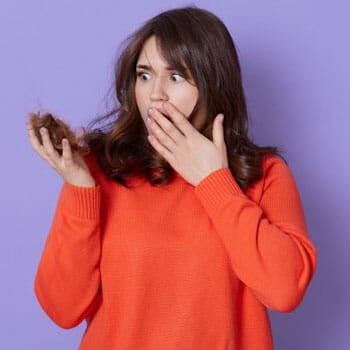
In my coaching practice, I've worked with both men and women struggling with hair loss. It's clear that both genders can be affected, though the patterns and causes might differ.
My experience has shown that understanding these differences is crucial for effective treatment and support.
Hair loss triggered by a hormonal imbalance and elevated DHT might be less common in women, but the result is practically the same.
Where there is a difference in the hair loss is the pattern on the head. Men tend to recede from the front to the back, while women usually show signs of hair loss along the top of the scalp.
FAQs
Is Hair Loss From Testosterone Reversible?
Yes, hair loss from testosterone may be reversible with medication and specialized shampoos. Medical solutions often use 5-alpha-reductase inhibitors that reduce the amount of DHT the body produces. This tends to slow down and even reverse some of the baldness effects.
What Hormone Makes Your Hair Grow?
Estrogen makes hair grow in women, but in men, the hormone relationship is different.
Here it is the level of DHT that has the most impact on hair growth.
More specifically, it’s lower levels of DHT that may contribute to healthier hair follicles and reduced baldness.
References:
- https://pubmed.ncbi.nlm.nih.gov/14757277/
- https://jddonline.com/articles/dermatology/S1545961616P1001X
- https://www.23andme.com/topics/traits/bald-spot/
About The Author
You May Also Like

